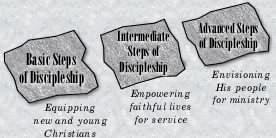
Study Questions for Stepping from Fear into Love
Basics for Christian Living
Page 1 | Page 2 | Study Questions
Paul J. Bucknell
Fear is not Bad but Imperfect
Because of confidence in modern parenting, Christians are greatly confused over Christian discipleship and their understanding of God. No wonder so many Christians can’t properly grow up!
1) What is the two-staged training program John refers to in 1 John 4:18?
2) What important factor does fear play in our lives when young spiritually and physically?
3) How does modern secularism handle discipline, chastisement and fear? Why?
4) How does one transition spiritually from being fear-based to love-based?
5) Is it good to get rid of fear like scaffolding when one learns of God’s love? (Study the term God-fearing in the scriptures.)
6) Describe how spiritually living by love far surpasses living from fear.
7) What are the two ways mentioned to instigate fear and obedience in children? Which is proper?
8) Were you brought up with fear? Explain.
9) Have you ever spiritually transitioned into fully living for the pleasure of God due to being convinced of His great love for you? Explain your journey the best you can.
The Christian Life and Love
The transition from fear to love is needed for Christian believers or growth will be sharply stymied such as those in legalistic backgrounds or with controlling parents. The rules and associated fears are good and will remain as a net to catch us if our pure love for God deteriorates. Our Lord, however, wants us to move from simple obedience originating in fear into a joyful obedience blossoming in a context of love.
When we Christian believers sense God’s deep love for us, then our growing trust increasingly shapes our daily decisions and life commitments in order to please Him. We move far beyond just plain dutiful thinking about our welfare into the joy of giving, helping, loving, and serving. God ushers us into the kind of obedience that springs from a heart of gratitude where we delight to please Him our Father in response to what He has done for us.
 The perfection that John speaks of is a greater way to live out our Christian lives. Without confidence of God’s love and appreciation of our obedience, the believer will not be able to mature into this more perfect form of spiritual faith and living.
The perfection that John speaks of is a greater way to live out our Christian lives. Without confidence of God’s love and appreciation of our obedience, the believer will not be able to mature into this more perfect form of spiritual faith and living.
Undergirding all of this is God’s genuine love for us, far greater than any of our earthly fathers could provide. Along with a deeper revelation of His love, we can understand His constant love and begin to relate to Him and others on a higher level. Our understanding of His love for us will grow, and this in turn will draw our hearts into a deeper search to know more of His love.
If we never grew up in a happy family, we might not know how much God our Father delights in His relationship with us. Or sometimes Satan cleverly hides our parents’ love for us.
• The Lord wants to embrace us, but because we do not believe we are significant, we shun His embrace.
• The Lord wants to encourage us,
but we doubt His purpose by thinking, “God has a sinister purpose for asking me to do this.”
• The Lord wants us to wholeheartedly respond to His constant love, but we do not even believe He would have such a pure intention.
• The Lord appreciates all our striving to do good, but we do not believe He cares much about what we do, just so we stay out-of-sight.
Our Calling to Step into His Love
Do we see how our belief is shaped by our early training and need to go from living from fear into a mature, deeper love of God? Because of our pride, we are often unwilling to allow God’s Word to give us a true and accurate understanding of God. We might say we believe in the love of God but not really. In such cases we need to repent from our poor understanding of God and the many times we have refused to come closer to Him. We have lost out.
Positively, however, the Lord is present even now calling us to step closer. This is His promise. As we step closer, He steps closer to us (James 4:8). This promise is based on God’s constant love for and joy in His children. He wants all of His children to grow up into strong healthy children motivated by a full desire to please Him.
Find your way in the plethora of BFF Biblically-based materials!
info@foundationsforfreedom.net
Scriptures typically quoted from the New American Standard Bible unless noted:
(C) Copyright The Lockman Foundation 1988












